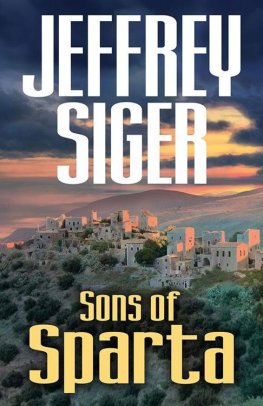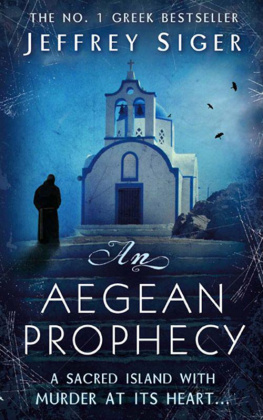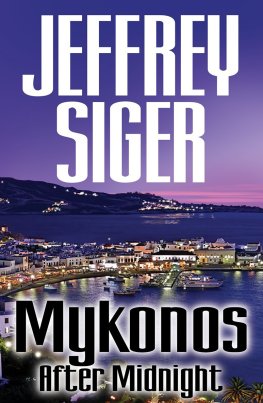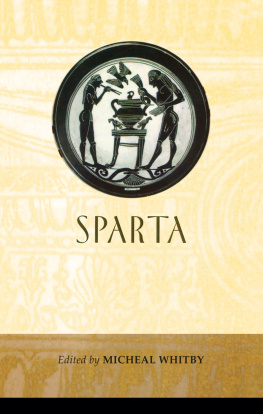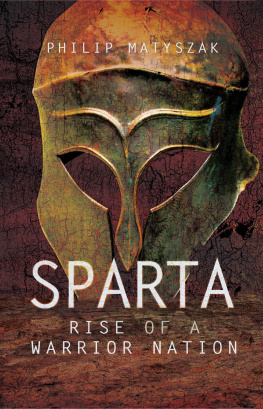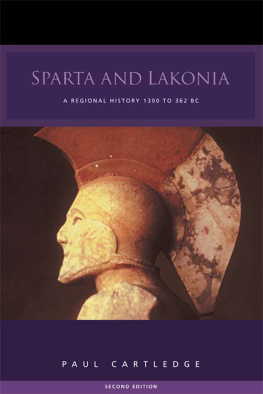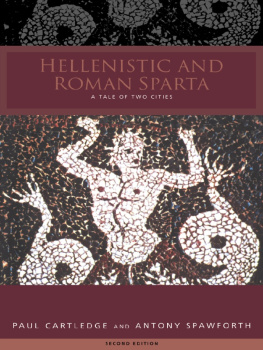Jeffrey Siger - Sons of Sparta
Here you can read online Jeffrey Siger - Sons of Sparta full text of the book (entire story) in english for free. Download pdf and epub, get meaning, cover and reviews about this ebook. year: 2014, publisher: Poisoned Pen Press, genre: Detective and thriller. Description of the work, (preface) as well as reviews are available. Best literature library LitArk.com created for fans of good reading and offers a wide selection of genres:
Romance novel
Science fiction
Adventure
Detective
Science
History
Home and family
Prose
Art
Politics
Computer
Non-fiction
Religion
Business
Children
Humor
Choose a favorite category and find really read worthwhile books. Enjoy immersion in the world of imagination, feel the emotions of the characters or learn something new for yourself, make an fascinating discovery.
- Book:Sons of Sparta
- Author:
- Publisher:Poisoned Pen Press
- Genre:
- Year:2014
- ISBN:9781464203169
- Rating:3 / 5
- Favourites:Add to favourites
- Your mark:
- 60
- 1
- 2
- 3
- 4
- 5
Sons of Sparta: summary, description and annotation
We offer to read an annotation, description, summary or preface (depends on what the author of the book "Sons of Sparta" wrote himself). If you haven't found the necessary information about the book — write in the comments, we will try to find it.
Sons of Sparta — read online for free the complete book (whole text) full work
Below is the text of the book, divided by pages. System saving the place of the last page read, allows you to conveniently read the book "Sons of Sparta" online for free, without having to search again every time where you left off. Put a bookmark, and you can go to the page where you finished reading at any time.
Font size:
Interval:
Bookmark:
Jeffrey Siger
Sons of Sparta
[I]n this century, scarcely a word has been written on the remote and barren but astonishing region of the Manibut the name of the Mani at once suggests four ideas to any Greek: the custom of the blood feud, dirges, Petrobey Mavromichalis, the leader of the Maniots in the Greek War of Independence and the fact that the Maniwrested its freedom from the Turks and maintained a precarious independence.
Patrick Leigh Fermor (19152011) MANI: Travels in the Southern Peloponnese (1958)Chapter One
As he drove alone down the highway the tune kept running through his head. An old Greek ballad. He couldnt shake it. Not since early morning, when his fathers brother called to say, Come home at once, offering no more of an explanation than Its a family matter.
Everyone in his family knew the words that went with the tune, lyrics that spoke of family honor and all that was expected of those duty-bound to protect it. The song told the story of his fathers father and what his family had demanded of him a hundred years before:
In the early 1900s a young medical student studying in Athens received a message from his father to return home at once. The trip from Athens to the Mani, in the southernmost part of Greeces Peloponnese, took several days. When the student arrived home he learned that his younger sister had humiliated their father by becoming pregnant by a young man in their village. Her lover had proposed to marry his sister, but their father refused. Instead, in front of his sister and her lover he told his son to shoot and kill them both.
The lovers ran from the house, but the brother caught up with his sister in the courtyard and murdered her there. His sisters lover he caught and killed at the port as he tried to escape by boat.
At the trial of the brother for killing his sister and her lover, the Judge was about to render his decision when the Judges mother stood and shouted at her son, Just remember before you pass judgment that you murdered your own sister for the very same reason.
The brother was acquitted and returned to medical school.
The driver shot a quick glance down at the Corinth canal as he passed west from the Greek mainland onto the Peloponnese peninsula.
I wonder what Uncle has in mind, thought Greeces Special Crimes Division detective Yianni Kouros. Judges werent as forgiving these days as they had been in his grandfathers day.
***
The Peloponnese stood as the southernmost part of mainland Greece, about the same size as the American state of Massachusetts. It had served as the setting for much of the blood-soaked drama that played out across ancient Greece, as well as the ancestral home to Spartan power that had rattled the ancient world even more than its legend resonated in popular imagination today. Many said the ancient Spartans simply vanished from the Earth without a trace, same as their city. Others believed they had gone farther south and found sanctuary deep in the mountain-spined, middle peninsula of the trident-shaped tip of the Peloponnese, to the region known as the Mani.
Kouros smiled as he recalled his father blasting anyone who dared question the Manis claim to Spartan origins. Maniots took great pride in their regions colorful, notorious history as home to their pirate, highwayman, and warrior ancestors; in men and women fighting ferociously alongside other Maniots to defeat every foreign force foolish enough to attempt to occupy their part of Greece; and in being the first to declare war on the Turks in Greeces 1821 War of Independence.
But the smile faded as he thought of his uncle, the last male of his generation. The others had all died young, Kouros father the only one from natural causes.
West of Corinth, Kouros turned south at Tripoli onto a two-lane road toward Sparta. In these late October days, with most tourists gone, hed made good time, but still had halfway to go, and beyond Sparta the road would slow him down even more. This wasnt the Sparta of ancient times, whose inhabitants lived a warrior life disinterested in erecting the magnificent edifices so important to their northern Peloponnese neighbors and the far-off Athenians. No, this was modern Sparta, a town of government offices, businesses, and residences where prosperity depended upon groves of oranges and olives, not on war.
North of Sparta the road coursed through a five-mile stretch of lush, high, mountain passes overlooking broad green valleys and a horizon of jagged mountain giants. He always wondered as he traveled through this wilderness why nearly one-half of Greeces eleven million people chose to live crammed together around Athens with so much of Greece this green and uninhabited.
And Im one of them.
South of Sparta, Kouros passed into the Mani. The land turned harsher, wilder, tougher, less forgiving, though still green and filled with citrus, olives, and corn. But once he turned west and began climbing the rugged north-south Taygetos mountain range, greens swiftly turned to browns and grays. On the other side of those mountains lay the region of the Mani his family called home-arid rocky land penned in by the Ionian Sea to the west and worn-down limestone mountains to the east, a place where olive trees battled with boulders for the regions arable land.
The source of this part of the Manis only significant modern economy loomed like sentinels along the ridges and hillsides: ancient four- and five-story, square, stone battle towers, historical treasures erected by Mani families as far back as the thirteenth century, which today drew tourists in flocks.
But to Kouros the towers were stark reminders of another side to the Maniots fierce character, for although they offered strong defensive positions against bandits, pirates, and foreign invaders, their principal purpose served the families ruthless battles with their neighbors. Here the concept of family vendetta was so deeply engrained that Mani society had rules on how, when, and against whom vengeance could and could not be taken. Doctors and priests, for instance, were considered too valuable to the community to serve as targets of an offended family.
At the southern end of a long, wide plateau running between the road and the mountains, Kouros turned left and followed a rock and dirt lane up toward a sharp-edged, two-story stone farmhouse. Decade-old cars and a couple of beat-up pickups sat parked every which way next to a five-story, beige and gray tower made of the same stone as the farmhouse a hundred feet away.
He parked next to one of the pickups and sat for a moment, staring at the farmhouse. Everything about it, from the color of its walls, its roughhewn wooden front door, and its traditional Peloponnesian terra-cotta-tiled roof, brought one word to mind: nondescript.
Precisely how his uncle wanted his home to appear to the outside world.
***
On the other side of the farmhouse door lay what few could imagine existed in historically impoverished, southwest Mani. This was Mesa or Deep Mani, where people struggled with virtually waterless, salt-wind-driven land, enduring lives far more difficult than did Maniots living in the fertile, olive- and honey-rich areas of Exo or Outer Mani to the north, or to the east, beyond the Taygetos mountain range, in Kato or Lower Mani.
Amid land so poor and scarce that not even the deeply held Greek tradition of dowry was practiced, Uncles home featured artwork and furnishings as fine as any to be found in a ship owners Athenian mansion. Its ground floor, which once functioned as stables, mangers, and a barrier from the damp ground, now served as the main living area.
Kouros grandfather had lived in this house after finishing medical school. Hed returned to his village to practice medicine, serving what he called his penance for taking his sisters and her lovers lives. He spent his life committed to helping any woman in trouble, defending her however necessary, knowing hed be spared vendetta assassination by reason of his position as a doctor. In this same house, hed lived to die in his sleep after fathering four sons and two daughters.
Font size:
Interval:
Bookmark:
Similar books «Sons of Sparta»
Look at similar books to Sons of Sparta. We have selected literature similar in name and meaning in the hope of providing readers with more options to find new, interesting, not yet read works.
Discussion, reviews of the book Sons of Sparta and just readers' own opinions. Leave your comments, write what you think about the work, its meaning or the main characters. Specify what exactly you liked and what you didn't like, and why you think so.

